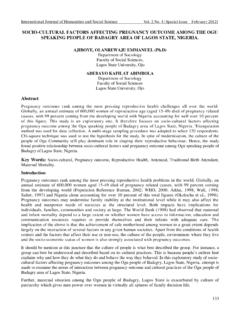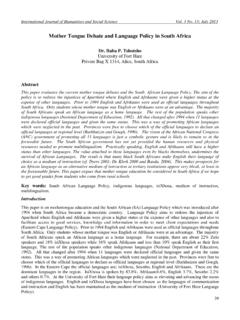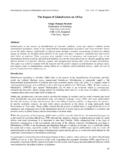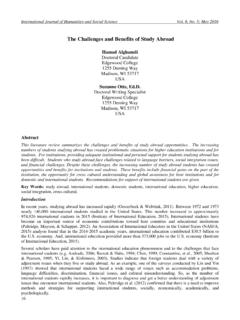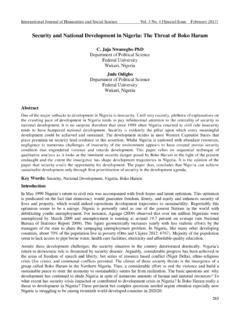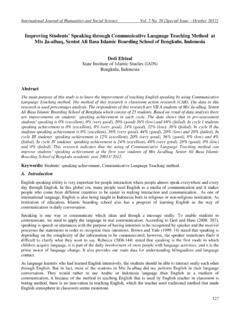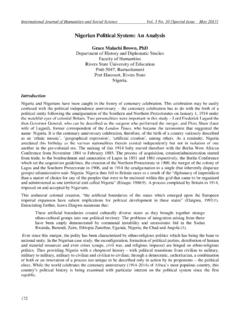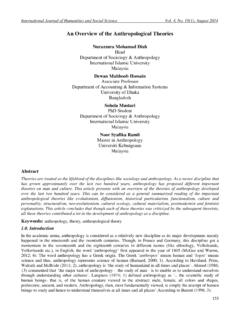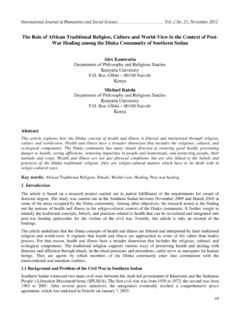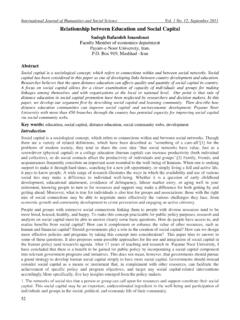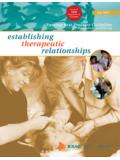Transcription of Seven Ethical Requirements for Quantitative and ...
1 International Journal of Humanities and Social Science Volume 7 Number 7 July 2017. Seven Ethical Requirements for Quantitative and Qualitative Research in nursing : Experiences of Three Research Ethics Committees from Santiago, Chile Irene Acevedo P rez Registered Nurse Master of Science in Bioethics President of the Scientific Ethics Committee Faculty of Infirmary Universidad Andr s Bello Teacher at the Faculty of Infirmary Universidad Andr s Bello Teacher at the Faculty of health Sciences Universidad Diego Portales Mar a Eugenia Rapiman Registered Nurse Master s Degree in Psychology Graduate Diploma in Bioethics Member of the Research Ethics Committee Faculty of Medicine at Universidad Diego Portales Teacher at the Faculty of health Sciences Universidad Diego Portales Marianella C neo Orellana Registered Nurse Midwife Graduate Diploma in Bioethics Vice-President at the Scientific
2 Ethics Committee Universidad Andr s Bello Teacher at the Faculty of Medicine Universidad Diego Portales Laura Rueda Castro Registered Occupational Therapy Master of Science in Bioethics President of the Scientific Ethics Committee CESFAM Cristo Vive Teacher at the Faculty of Medicine Universidad de Chile Abstract Scientific research is one of the tools that strengthen the nursing discipline by generating new knowledge, which provides theoretical support and contributes the necessary evidence to improve nursing care performance of health professionals in all their practical and theoretical activities. Subsequent to the historical events related with research on human beings performed during the 20th century, in which researchers favored the search of new knowledge and were particularly concerned with achieving their scientific successes rather than taking care of the well-being of the individual study patient, brought about the first laws, codes and a bill of rights to regulate research from an Ethical point of view.
3 Their purpose was to avoid actions or situations which could attempt against the basic principles of respect to the human dignity. 19. ISSN 2220-8488 (Print), 2221-0989 (Online) Center for Promoting Ideas, USA Today, when carrying out a research project it is not only necessary to rigorously apply each one of the steps of the scientific method, but also to comply thoroughly with the Ethical aspects. In that context, the concerns regarding the Ethical aspects involved in research on human beings demand the review of the principles and Requirements that such investigations must comply with in order to be considered Ethical . The present document intends to analyze the Seven Ethical Requirements proposed by Ezekiel Emanuel to Quantitative studies also to qualitative research paradigms.
4 His Requirements should be taken into account by the nursing professional when planning and carrying out a research project during undergraduate, graduate or certification programs, as well as members of research ethics committees that review and approve research projects. Historical background of ethics regulations The advancements in medicine are contributing to a great number of benefits for healthy or sick people but, on the other hand, investigations in this field have led to the development of various Ethical dilemmas resulting, on certain occasions, of not complying with established rules, codes, or regulations of scientific research. While it is true that research on human beings should have as a purpose of contributing to the improvement of diagnostic and prophylactic procedures, and also to the understanding of the etiology and pathogenesis of a disease, with the goal of generating knowledge to ameliorate the quality of health care , it is nevertheless also true that these studies should be thoroughly reviewed to protect the rights of participants and, specially, of the vulnerable populations, in order to avoid a violation of their dignity.
5 At the present time, the primary requirement before starting any research involving human participants includes the Ethical considerations. This demand is underpinned by historical events related to research on human beings carried out during the 20th century, where researchers favored the search of new knowledge more concerned with the achievement of their scientific successes rather than in the well-being of the individual. The first laws to regulate clinical research arose in 1931, the German Law. In 1947, the excesses of the Nazi period led to the drafting of the Nuremberg Code consisting of Ethical rules about experimentation on human beings, which attempted to reconcile medical research and ethics.
6 The Nuremberg Code emphasized the importance of voluntary, informed consent of people undergoing an experiment (without any kind of coercion), the need to avoid any unnecessary physical or mental suffering to the participant, and to provide evidence that the experiment is necessary and will entail a benefit for the whole society(1). The aspects not covered in this code were the inclusion of people with limitations to give their informed consent and the independent assessment of the research. The Nuremberg principles were later reviewed and enriched in the Declaration of Helsinki created in 1964 by the World Medical Association, which has been revised Seven times (last review 2013).
7 Relevant aspects of this international rule include the review of research protocols by Ethics Committees (1975), as well as a regulation of the use of placebo in clinical trials (1996), and guarantees of continuity of treatment (2000). However, between the 40s and the 70s and even after the publication of the Nuremberg Code and the first versions of the Declaration of Helsinki, such studies as the Tuskegee study, Willowbrook or Brooklyn were conducted, as well as various experiments with radioactive material Two of the latter were disclosed in The Human Radiation Experiments: Final Report of the President s Advisory Committee delivered to President Clinton in 1996 (2) as actions which had infringed the rights of autonomy, security and dignity of the participants.
8 Thus, in 1974, the National Commission for the Protection of Human Subjects of Biomedical and Behavioral Research was created by means of a mandate of the United States Congress, whose purpose was to develop a proposal for a method of analysis and Ethical assessment of research projects. It identified the basic Ethical principles that should guide the biomedical research involving human participants. Three Principles were defined: Respect for people, Beneficence and Non-maleficence, and Justice. In 1982, the Council for International Organization of Medical Sciences (CIOMS), together with the World health Organization (WHO), developed the International Guidelines Proposed for Biomedical Research on Human Beings.
9 These guidelines aimed to present an effective method for the application of Ethical principles contained in the Nuremberg Code and in the Declaration of Helsinki for the protection of specific communities or populations and not only to protect isolated individuals in developing countries. In the year 2000, Ezekiel Emanuel accurately summarized the existing documents establishing the Ethical Requirements of biomedical research, stating Seven conditions that must be complied with in order for the research to be ethically correct: social value, scientific validity, equitable selection of subjects, favorable risk/benefit ratio, informed consent, respect for subjects and independent assessment.
10 20. International Journal of Humanities and Social Science Volume 7 Number 7 July 2017. (Ethics Committee).(3) While it is true that Ezekiel Emanuel defines that these Requirements must be applied in all clinical trials because of the higher risk for subjects in experimental studies with an intervention, it is nevertheless true that they should also be implemented on qualitative research paradigms on human subjects. The latter are widely used in undergraduate, graduate, or certification programs in the nursing discipline. The present document intends to analyze these Seven Ethical Requirements in qualitative, Quantitative and in research which uses both paradigms.
